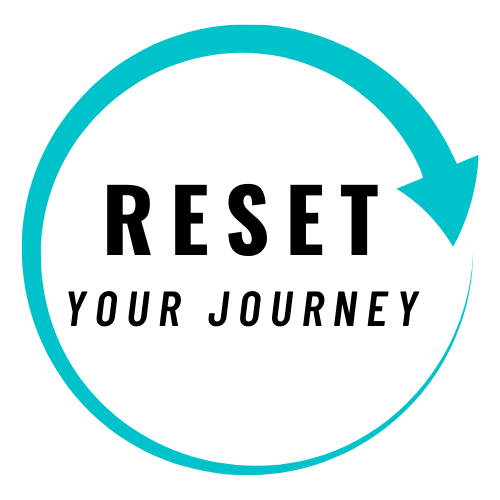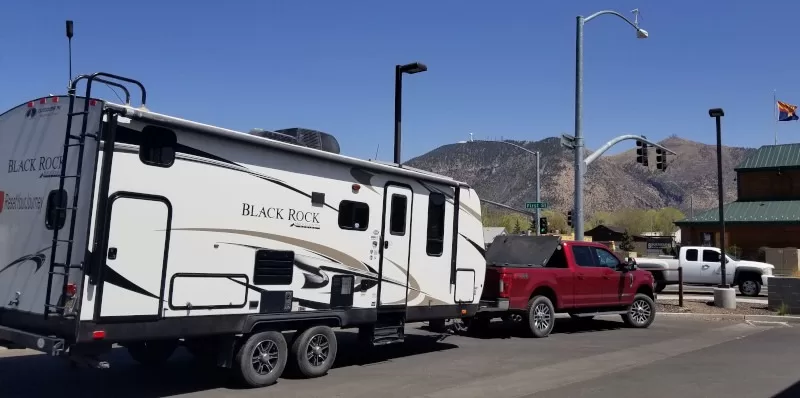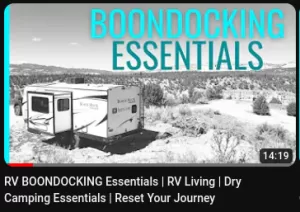Last Updated on 05/10/2024 by Glynn Willard
Beginner’s Tips For A Travel Trailer
Is this your first time diving into the RV lifestyle?
Or are you a new RV owner and this is your first RV trip?
Before you can safely embark on your first trip or first camping trip, it’s a good idea to review some of these RV tips.
Honestly, these tips are not just for RV beginners. Those with some time under their belt can also benefit (or even add to the list).
Also, this article is not just for people towing travel trailers, it’s for any RV beginner.
It’s amazing how easy it is to make mistakes when you’re under pressure. Add inexperience to the mix and the mistakes are amplified.
Even though new RVers researched, watched countless YouTube videos, practiced and mentally went over everything “RV”, they can still make mistakes. We certainly did!
Some of these mistakes are more difficult to correct than others. but, you’ll likely not make the same mistakes twice.
Here are some mistakes we made and learned the hard way as well as some of the best tips we’ve picked up during our endless road trips.

Boondocking north of Ouray, CO
Mistakes We Made With Our First Travel Trailer
- Not Completely Packing The Rig The Day Before Our Travel Trailer Camping Trip
- Trying To Cover Too Many Miles In One Day In An RV
- The maximum mileage I’ll drive in one day is 280 miles. That’s my personal comfort level.
- I leave at a time that allows me an arrival time no later than 3PM. Remember, you still have to find level ground and set up in RV parks before settling (or find a boondocking spot).
The best times to leave are several hours before rush hour or right after rush hour ends. Unless you’re in a really rural area, of course. - We prepare lunches, pack incidentals in the truck and clean the rig the day before leaving.
- Have a meal plan for that evenings dinner already established for moving day. We always ate tuna packets and frozen vegetables on moving day. I realize this is not appealing to most, but it was easy.
- I check tire pressure and do maintenance the day before.
- I check the weather and map the route the day before departure. Driving on windy days is not a smart move.
- Moving While Living Full Time In An RV Too Frequently
- Draining Your RV Batteries
- Running Out Of Water
We had our lists. We had our RV essentials and necessary RV equipment in piles separated by location. And we had good intentions.
But, that wasn’t enough!
Oh yeah, no problem, the important thing is we can still easily leave by 10 or 11 AM. Ha! Wishful thinking!
More like 2:30 PM and we were rushing. What happens when you rush?
You forget things and make mistakes! And we forgot a lot and packed too much weight.
So, pack the rig the day before, connect the tow vehicle/toad and then pack a night bag with essential items for an overnight in the house.
Especially if it’s a new rig and you’re getting to know all the small spaces and storage space.
Oh, and there’s no need to pack the sleeping bag since your rig is equipped more like a house.
While I’m on the subject, we packed a heavy Camp Chef camp stove and extra propane tank. It was so inconvenient to set up, we almost never used it!
Regardless, you’ll remember ten things you forgot while you’re preparing to sleep.
And most importantly, you won’t rush to your first destination.
Which leads me to the next point.
I like to drive slowly and under control. When you’re towing a heavy trailer or driving a heavy rig, bad things happen at high speed on the open road.
As far as I’m concerned, my speed is something of which I have full control.
Why increase my risk, my family’s risk and other driver’s risk just to cover more ground?
What’s the rush for anyway if you’re full timing?
Even if you’re not full-timing, the best way is to leave on time and take your time.
So, I use the following guidelines:
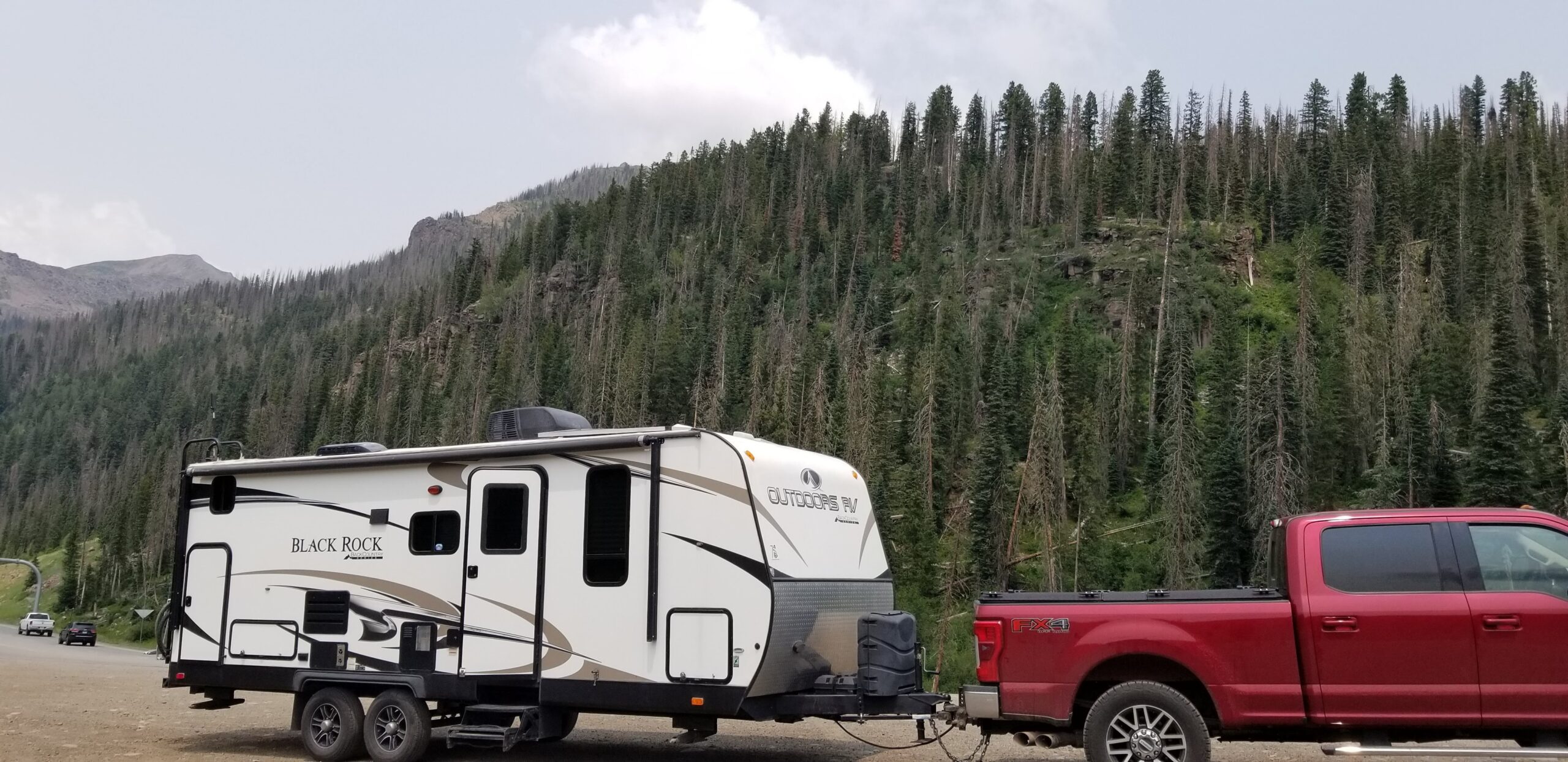
How often should you move while living full-time in an RV? No matter how much of a hurry you are in to make it somewhere, try to take every third day off.
That’s a minimum if you’re full-time.
At some point, you have to recharge your own batteries!
Initially, over time, we found four to five days of stationary to one day of moving to be very doable.
But as time evolved, we preferred to stay six to ten days in one location.
It gives enough time to explore the local attractions.
There’s enough time to get school work, regular work and laundry done.
And finally, it leaves enough time to do preventative maintenance on the rig and tow vehicle.
Never disregard the preventative maintenance aspect of your travels!
In addition, moving every 6-10 days is frequent enough to cover a lot of ground and see more of the country.
There’s also a lot to be said for staying put a month at a time to lower your “lodging” expenses. But we’re not full-timing to stay put.
We want to experience new things and meet a lot of people.
So, again, we’ve found six to ten days of stationary to one day of moving to be our most comfortable pace.
Yeah, I’m guilty. We don’t even have lithium batteries and I drained them on the first night out. I was a total RV newbie!
We got a late start, I was exhausted and it was really cold outside. So, naturally, I finished setting up and used the furnace.
Awesome, we have 60 pounds of propane! Well, you have to have some form of electricity to run the fan.
And it doesn’t take long for the heater fan to draw down the batteries.
I knew this. But I was so exhausted and overwhelmed that I thought nothing of running the furnace fan off the batteries. It didn’t take long to drain our two batteries.
So, on day one I shortened their lifespan and limited their capacity. Again, they’re not lithium.
I learned very quickly (the hard way) how to balance our energy consumption. Initially, it was a steep learning curve.
But it didn’t take long to figure out how much power each family member required and budget accordingly.
If you’re a beginner RVer, make it a point to learn the amperage draw from your appliances, devices and fixtures.
Then make a mental note of what you can and cannot run off the batteries before fully draining them.
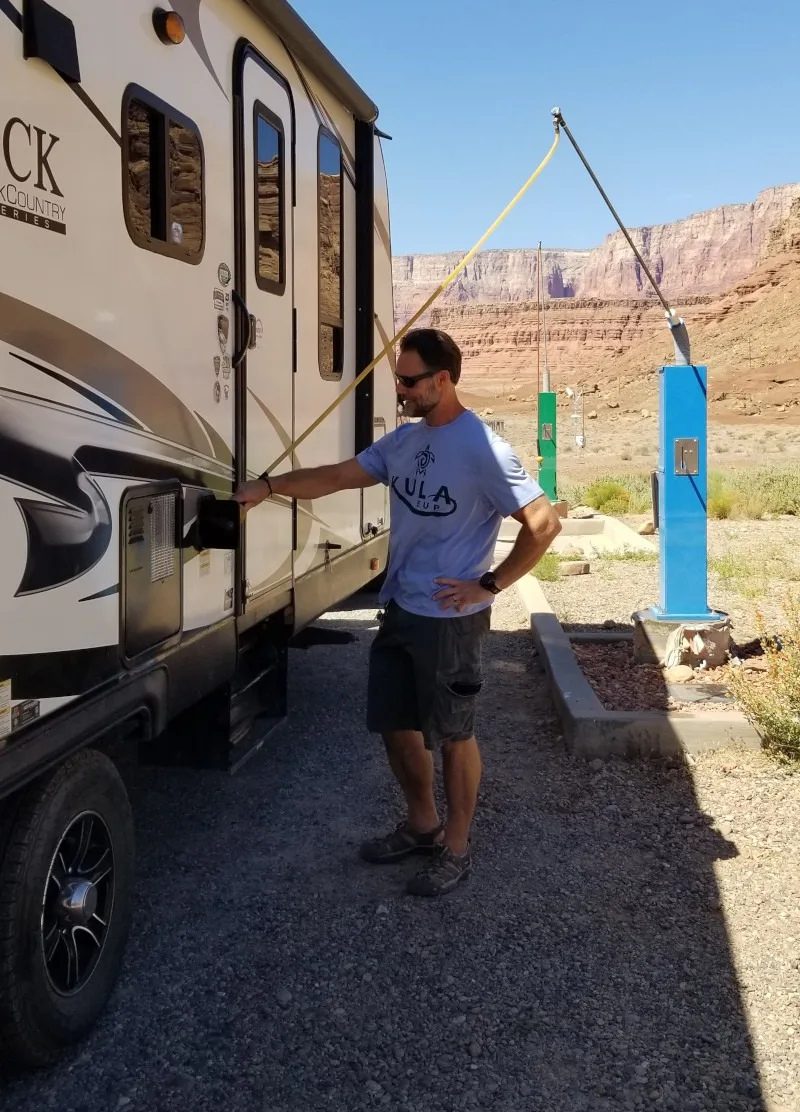
Dump station at Lee’s Ferry, AZ
We thought we had taken enough water for two nights of boondocking when we first left. And it seemed like I was filling the tank forever.
Nope, not enough.
We ran out just after dinner on our second night out.
Fortunately, we were staying at a Harvest Host’s/Boondocker’s Welcome distillery.
And they were kind enough to allow us to fill all of our water bottles to hold us over until we found a place to fill our fresh water tank.
However, there was no way to fill our tank there, so we had no water for dishes or personal hygiene until our next location.
Not a big deal. Just more of an annoyance.
On a side note, most gauges on RV’s for the fresh water tanks, gray tank and black tank are rudimentary and lack accuracy.
If you haven’t yet experienced this, you soon will.
So, knowing how much water you and your family consume in a day is a good starting point.
Calculating your water usage will likely take months on the road before you have this system perfected.
When calculating your total cargo carrying capacity, make sure you take into account, a full freshwater tank and stay within your gross vehicle weight rating with all of your stuff in the RV.
Be careful! It’s easy to carry too much weight.
So, if you’re going to be full-time, learn your water consumption rate. This number will have the most impact on the amount of time you can boondock in one location.
This video was one of our earliest. Please don’t judge. They improved a lot!
Beginner RV Tips
- Practice maneuvering in an empty parking lot.
Regardless of whether you have a new travel trailer, fifth wheel, or motorhome, learning the complexities of a towable RV or large motorhome in a safe space is essential!That even applies to pop-up campers if you’re new to towing.
- Use a moving day checklist for your RV.
Using a checklist when you’re moving your RV can help prevent mishaps, especially when you’re new to the RV lifestyle.
- Check your tire pressure daily.
Get into the habit of doing this! When you’re towing that much weight (not just larger trailers), one of the weakest links in the chain is your wheels. Part of your “RV basics” is to stay on top of your tire psi to prevent accidents.Also, adjust your tire pressure based on the ambient temperature of your current environment. It’s not unheard of to move to different climates in one day.
- Torque the lug nuts on all wheels every second move.
It doesn’t take but a few minutes to check the torque on the wheel of your camper trailer, tow vehicle or motorhome. On several occasions, I’ve found a few loose lug nuts on my trailer. - Pack the basic tools for your type of RV in your rig.
When it comes to any type of RV (fifth-wheel trailers, toy haulers, bumper pulls, vans or motorhomes), a lot of things will break while you’re traveling the great outdoors.Having a basic understanding of how to fix systems in your rig can get you out of a lot of trouble. Especially when you’re boondocking in the middle of nowhere.
- Check your tire wear, suspension welds and axle appearance daily.
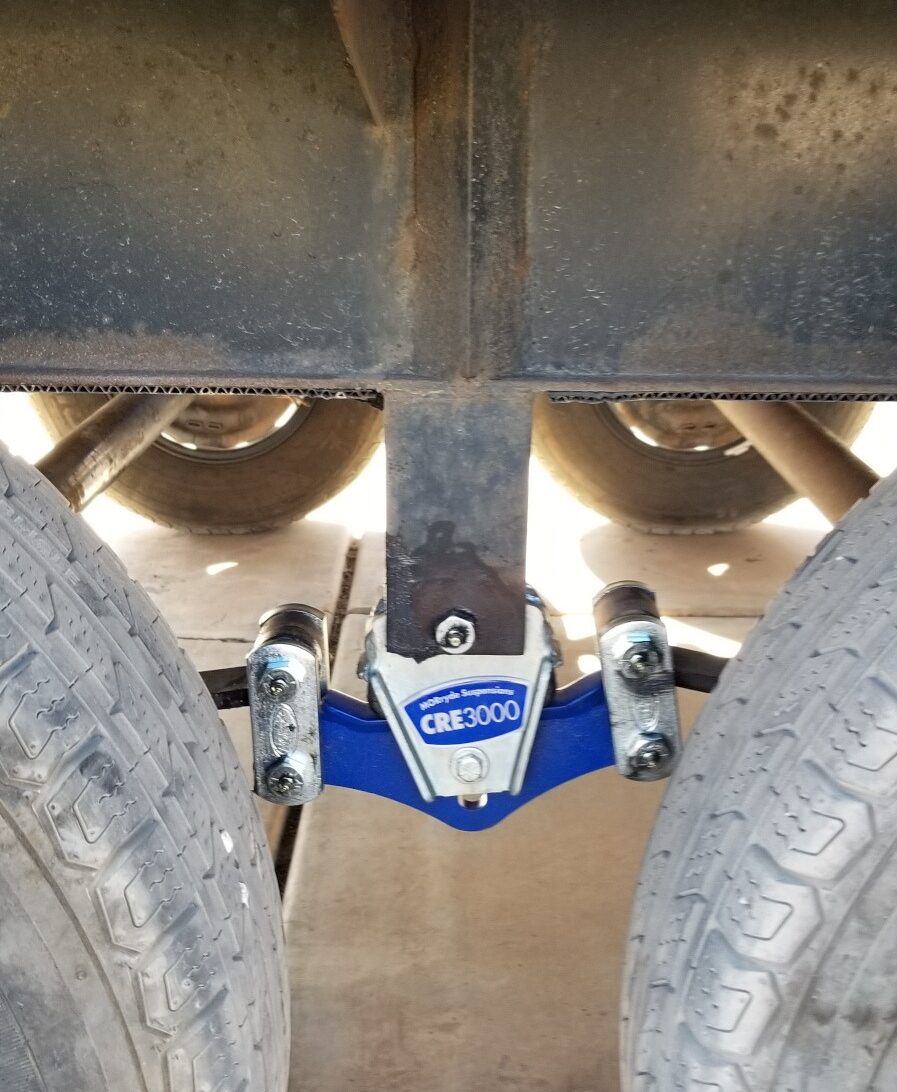
Your tires and suspension system talk to you if you know how to listen. Learn the signs to look for with unusual tire wear [LINK]so you can make the proper adjustments before problems occur. - Grease your Zerk valves on your suspension.
Look closely at your suspension system. It may have wet bolts that require a periodic application of new grease. This is something that should not be ignored. - If your RV is towable, clean and lube the hitch ball intermittently.
It’s just good practice to keep the moving parts of your RV clean and properly lubed. It helps prevent future issues. - Make sure you allow enough hours for a good night’s sleep the night before driving.
A good night’s sleep is super important when it comes to driving safety. Especially when you’re carrying so much cargo weight. - Check and tighten anything attached to your rig (bike rack, Jerry cans, spare tires, etc.) at every stop.
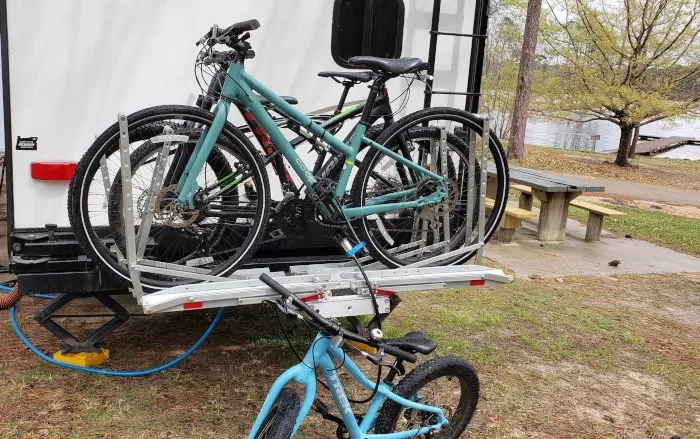
Check and tighten the bike rack at every stop.
It might seem like a pain, but whenever we stop at a truck stop or rest area, I check and tighten anything attached to our rig. - If your RV is towable, make sure your tow vehicle’s capacity.
Knowing your trailer weight and it’s tongue weight will help you decide which tow vehicle is right for your setup. It’s dangerous and unwise to tow a heavy trailer with a half-ton truck.You’re just asking for trailer sway, weak stopping power and an overloaded rear axle.
- Review the route on Google Maps the night before a moving day.
Familiarizing yourself with the route the night before can really reduce anxiety and make for smooth travels. It also give you an opportunity to figure out where to dump your tanks along the route and pick up more freshwater.Fuel is expensive. The more efficient the trip, the better!
- Check the weather the night before along the route and plan accordingly.
Traveling with a heavy rig through storms, heavy rain or strong winds is not smart. If you can alter your travel days or routes when inclement weather is predicted, you might just be preventing an accident.We use the Windy App to determine gusts along the way. The max I’m willing to tow our trailer in is 40 mph gusts. Anything more and we wait it out.
Again, know the weather conditions of your route and destination several days before moving day.
- Stop frequently along your route to rest your legs and use public facilities.
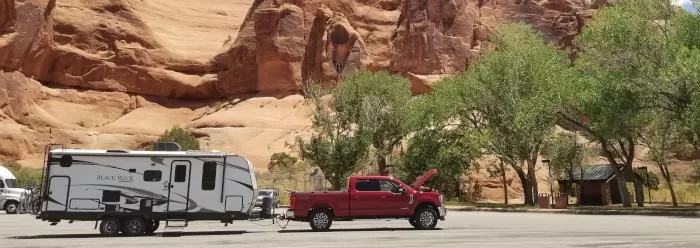
Taking a rest to use public facilities in UT.
We prefer not to fill our gray tank and black water tank when we don’t have to. Save them for boondocking unless you can’t find public facilities.Besides, it’s a good opportunity to stretch the legs and do a safety check of your rig.
- Plan your grocery store trips into your moving day.
This forces you to stop, eat a meal, resupply your groceries, swing into one of the local gas stations and start the second part of your day fresh.
Besides, it’s an opportunity to remedy the ingredients you forgot for your camp cooking recipes.
- Adjust your calories down on moving days.
Think about it, you’re sedentary most of the day sitting in a moving vehicle. You don’t need as many calories. That’s the nutritionist in me speaking! - Plan some of your trips around National Parks.
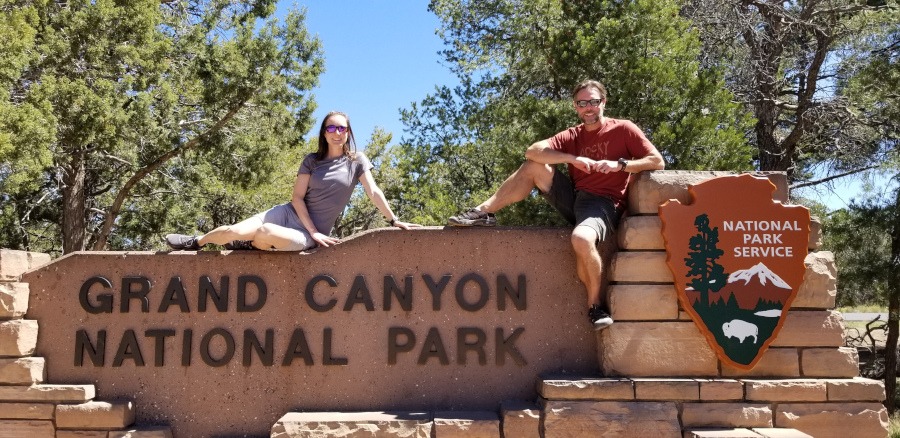
Purchasing a National Parks Pass and boondocking outside a park on public lands is the key to an amazing affordable experience!A secret RV road trip tip is to obtain your freshwater and dump your tanks for free in National Parks.
We’ve found National Parks to offer the cleanest dump stations and best tasking water of all!
- Introduce yourself to everyone along your RV camping adventures.
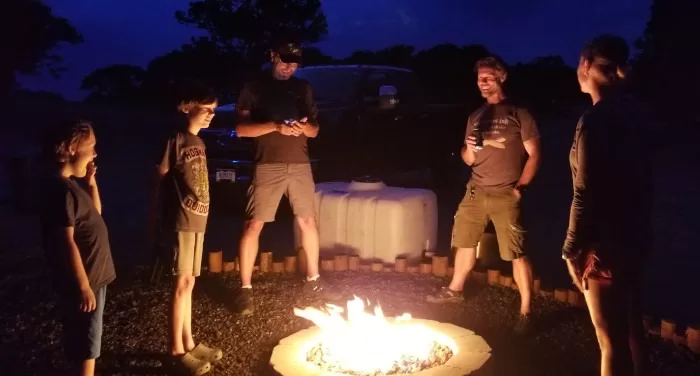
You meet some really great people around RV’s
RV people are super friendly and helpful. Before you know it, you might just find yourself in their RV campsite next to their fire pit having a time and making new friends.We found ourselves meeting up at different locations with the people we met along the way. It’s a great way to full-time RV!
Not Sure What You Need For Your RV?
Wrapping Up Travel Trailer Tips For Beginners
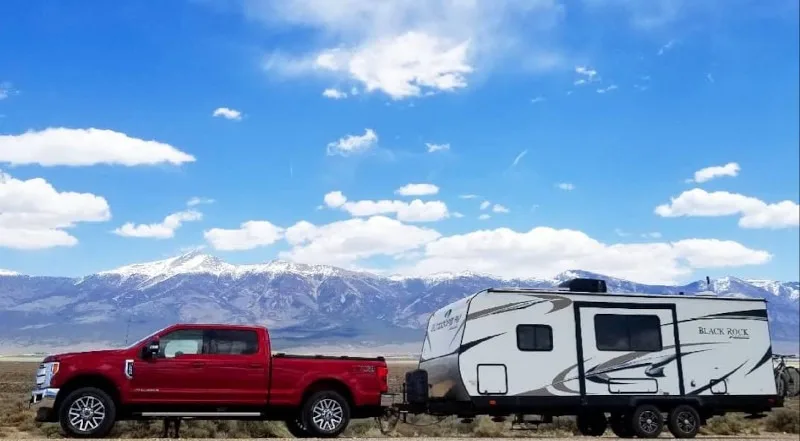
When you’re new to RVing, you’re going to make mistakes. But that’s okay because that’s how you learn.
And seriously, you can survive just about all of the newbie mistakes unscathed.
Stay patient, take your time and think rationally.
You’ll be fine.
Get to know your electrical system, plumbing system and water consumption rate as early in the game as possible.
Carry all the essential tools on board your RV. You’ll be glad you did.
Plan your routes realistically. You’ll learn to love the short drives and loathe the long days on the road.
Stay ahead of this by booking your stays a maximum of 280 miles apart.
Planning and preparation are the keys to making your best RV experience. Regardless of whether you are full-time, part-time or a weekend warrior.
Most importantly, it allows more time to do fun things!
If you already have an RV, what kind of simple RV camping tips can you share?
Meet the author.
We appreciate any help we can get to bring you great content. Donate or buy us a coffee on our Ko-Fi site.

